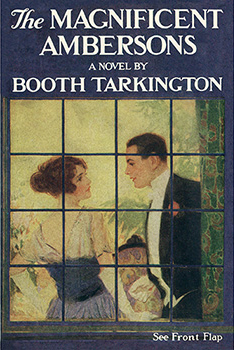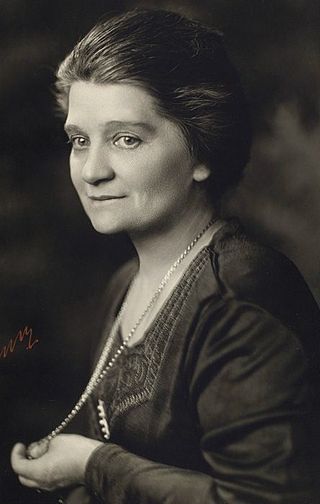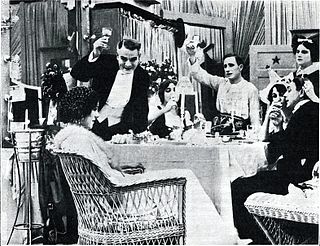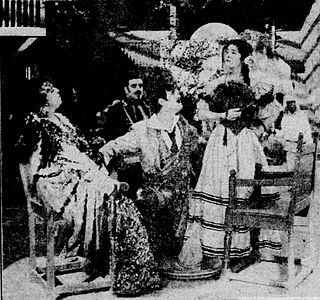
Laurence Harvey was a Lithuanian-born actor and film director. He was born to Lithuanian Jewish parents and emigrated to South Africa at an early age, before later settling in the United Kingdom after World War II. In a career that spanned a quarter of a century, Harvey appeared in stage, film and television productions primarily in the United Kingdom and the United States.

The Magnificent Ambersons is a 1918 novel by Booth Tarkington, the second in his Growth trilogy after The Turmoil (1915) and before The Midlander. It won the Pulitzer Prize for fiction.

Lucy Beaumont was an English actress of the stage and screen from Bristol.

LeRoy Franklin Mason was an American film actor who worked primarily in Westerns in both the silent and sound film eras. Mason was born in Larimore, North Dakota, on July 2, 1903.

John Harron was an American actor. He appeared in more than 160 films between 1918 and 1940.

A Sainted Devil is a 1924 American silent drama film directed by Joseph Henabery and starring Rudolph Valentino. The film was produced by Adolph Zukor and Jesse Lasky.

What's His Name is a 1914 American comedy-drama film directed by Cecil B. DeMille. A 35mm print of this film exists in the George Eastman House film archive.

Rose of the Rancho is a 1914 American silent Western film directed by Cecil B. DeMille. It is based upon the play of the same name by David Belasco and Richard Walton Tully. The film cost $16,988 to make, and grossed $87,028.

The Greatest Question is a 1919 American drama film directed by D. W. Griffith. Based upon a novel by William Hale, the film has a plot involving spiritualism.

The Girl Who Stayed at Home is a 1919 American silent drama film produced and directed by D. W. Griffith and released by Paramount Pictures. Prints of the film exist.

Get Your Man is an American silent romantic comedy film produced by Paramount Famous Lasky Corporation and released in 1927. The silent film was directed by Dorothy Arzner, and stars Clara Bow, Charles "Buddy" Rogers, and Josef Swickard. The Library of Congress holds an incomplete print of this film, missing two out of six reels. Paramount did not renew this film's copyright in 1955, so the film is now in the public domain.

The Man Who Lost Himself is a lost 1920 American silent comedy-drama film directed by Clarence G. Badger and George D. Baker. It was produced by its star, stage actor William Faversham, and Lewis J. Selznick. The film is based on the 1918 novel of the same title by Henry De Vere Stacpoole. Faversham plays dual roles of an English nobleman and an American who looks just like him.

In Again, Out Again is a 1917 American silent comedy film directed by John Emerson and written by Anita Loos. The film stars Douglas Fairbanks, Arline Pretty, Walter Walker, Arnold Lucy, Helen Greene, Homer Hunt, and Albert Parker. The film, that has 5 reels, was released on April 30, 1917, by Artcraft Pictures.

Jealous Husbands is a 1923 American silent drama film directed by Maurice Tourneur and starring Earle Williams, Jane Novak, and Ben Alexander.
The Lure of the Wild is a 1925 American silent melodrama film directed by Frank R. Strayer and starring Alan Roscoe, Jane Novak, and Lightning the Dog. It was produced and released by Columbia Pictures.

Chasing the Moon is a lost 1922 American silent drama film directed by Edward Sedgwick and starring Tom Mix. It was produced and released by the Fox Film Corporation.

Roi Cooper Megrue was an American playwright, producer, and director active on Broadway from 1914 to 1921.
One Increasing Purpose is a 1927 American silent drama film directed by Harry Beaumont and written by Bradley King. It is based on the 1925 novel One Increasing Purpose by A. S. M. Hutchinson. The film stars Edmund Lowe, Lila Lee, Holmes Herbert, May Allison, Huntley Gordon and Lawford Davidson. The film was released on January 2, 1927, by Fox Film Corporation.

Silk Stockings is a 1927 American silent comedy film directed by Wesley Ruggles and written by Beatrice Van and Albert DeMond. It is based on the 1914 play A Pair of Silk Stockings by Cyril Harcourt. The film stars Laura La Plante, John Harron, Otis Harlan, William Austin, Marcella Daly, and Heinie Conklin. The film was released on October 2, 1927, by Universal Pictures.

Night Life is a 1927 American silent drama film directed by George Archainbaud and starring Alice Day, John Harron, and Eddie Gribbon.


















